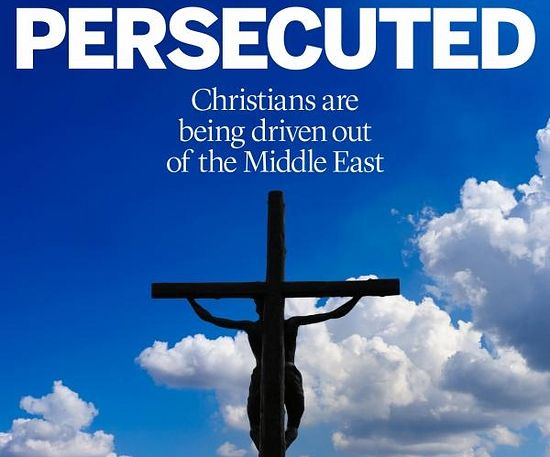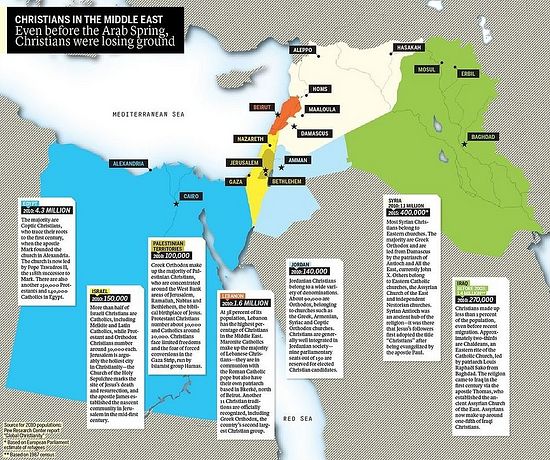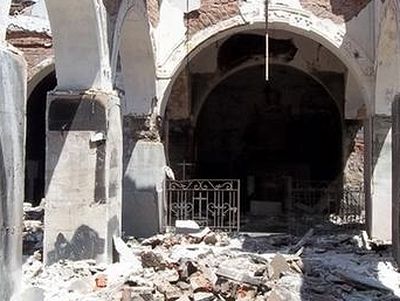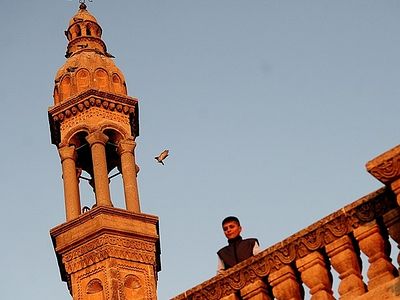Source: NEWSWEEK
Before jihadists overran this mountain town in 2013, Maaloula was one of the oldest Christian communities in Syria, where Western Aramaic—the language of Jesus Christ—is still spoken. It was also a place of profound peace, where Sunni and Shiite Muslim residents, along with their Christian neighbors, forged a pact early in the war to avoid the sectarian conflict ripping their country apart. “We decided that even if the mountains around us were exploding with fighting, we would not go to war,” Mahmoud Diab, a Sunni imam, toldNewsweek in 2012. “It’s a sectarian war, but the fact is, there is no war here in Maaloula. In this town, we are not defined by religion. We all know each other. Everyone is a Christian, and everyone is Muslim.”
Tolerance had been a tradition in Maaloula since St. Takla—the daughter of a pagan prince and an early disciple (and possibly wife) of St. Paul—fled to these mountains in the first century. She was escaping soldiers sent by her father, who was threatening to kill her for her ardent faith in her adopted religion. St. Takla was exhausted and, finding her way blocked by the sharp, rocky sides of a mountain, fell on her knees in desperate prayer. Legend has it the mountains parted, and she escaped. Maaloula means entrance in Aramaic. For centuries, Christians and Muslims have come here to pray for miracles, but the residents of Maaloula weren’t blind to the dangers that swirled around them when I visited on several occasions in 2012 and 2013. “I am afraid of the kind of people who will come here,” said Antoinette Nasrallah, a Syrian-American, originally from Miami, who owned a café in the center of town. “I am afraid of Salafists.”
Still, an ancient way of life prevailed in the convents and monasteries of Maaloula, set amid apricot trees that attracted songbirds.
The idyll was shattered on September 4, 2013, when a Jordanian suicide bomber exploded a truck at a Syrian army checkpoint at the entrance of the town. Eight soldiers were killed. Rebel opposition soldiers and jihadists fighting against Syrian President Bashar Assad attacked, and the battle of Maaloula, a UNESCO-protected town, had begun. The Syrian army led a counterattack two days later, regaining control, but the fighting continued. The rebels again took the town and this time burned down churches and began to drive out Christian residents.
At that point, nearly the entire population of Maaloula fled. Some went to Beirut, an unfortunate reminder of the gruesome slogan chanted by opposition members at rallies from the beginning of the conflict: “Christians to Beirut, Alawites to the coffin.”
The Syrian government eventually took back Maaloula, but in November 2013 more opposition forces—including the jihadist Jabhat al-Nusra (the Al-Qaeda franchise in Syria)—attacked. They kidnapped 12 nuns from the monastery to exchange for their captured fighters.
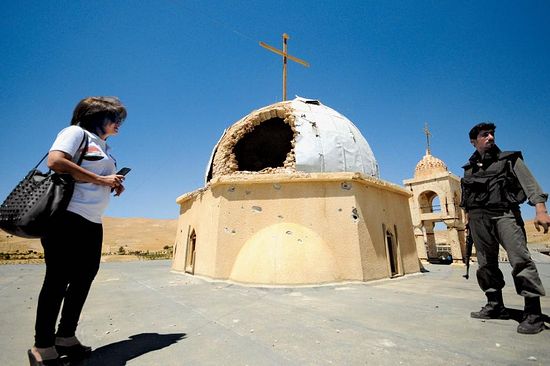 A soldier loyal to Syria's president Bashar Al-Assad stand beside a damaged church in Maaloula, Syria, August 21, 2014. OMAR SANADIKI/REUTERS
A soldier loyal to Syria's president Bashar Al-Assad stand beside a damaged church in Maaloula, Syria, August 21, 2014. OMAR SANADIKI/REUTERS
For nearly six months, the ancient town was again under siege until April 14, 2014, when the Syrian army—with the help of Iranian-backed Hezbollah militia—once more took control of Maaloula.
Recalling the assault by jihadists, 62-year-old Adnan Nasrallah told the Arabic daily newspaper Al Akbar: “I saw people wearing al-Nusra headbands who started shooting at crosses," adding that one of them “put a pistol to the head of my neighbor and forced him to convert to Islam by obliging him to repeat, 'There is no God but God.’
"Afterwards they joked, 'He's one of ours now.'”
The Syrian army still controls most of Maaloula, but only around 150 Christian families have returned. Many houses have been gutted by fires, and the churches and monasteries are damaged from the fighting.
As the season of Lent and abstinence leading up to Easter began in Maaloula in February, the faithful few gathered to pray. But they are no longer praying for cures for ailments or for a profitable harvest from their fields. Now they are praying for survival, because they know hundreds of their fellow Christians have been kidnapped and murdered by ISIS.
Despite this, they refuse to flee, because Syria is their country, their home. Mahmoud Diab, the imam, has left the town, but Antoinette Nasrallah is still in Maaloula. When I spoke to her by telephone a few weeks before Easter, she said the reason was simple: “It has to do with history.”
IN THE NAME OF GOD
Christians are only one of the many religious groups in Iraq and Syria that have suffered atrocities at the hands of ISIS, other armed groups and the Assad regime. Many more Muslims have been killed or driven from their homes, but ISIS has repeatedly trumpeted its attacks on Christians, whom it often refers to as “crusaders,” as part of a holy war it claims to be fighting in the name of Islam.
These latest horrors build on the prejudice, discrimination and oppression that over the past few decades have steadily reduced the proportion of Christians in the Middle East from around 20 percent at the start of the 20th century to around 5 percent now. Less than 1 percent of the world’s more than 2 billion Christians live in the Middle East, and there are fears that number could dwindle even further.
“Some of the oldest Christian communities in the world are disappearing in the very lands where their faith was born and first took root,” says the Center for American Progress in a report published in March. After the recent atrocities by ISIS, it says, “Christians have migrated from the region in increasing numbers, which is part of a longer-term exodus related to violence, persecution, and lack of economic opportunities stretching back decades.”
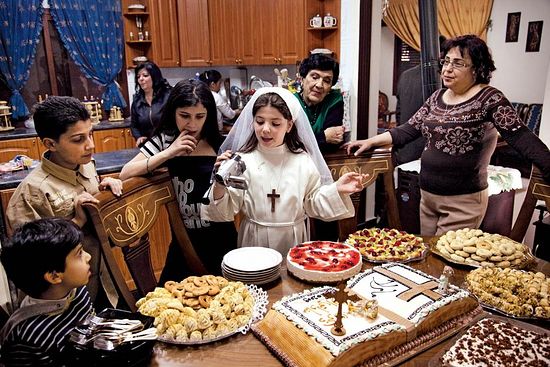 An Orthodox Christian family enjoys an abundance of food for their Easter lunch in the Jaramana district of southern Damascus, Syria on April 19, 2009. ED KASHI/VII
An Orthodox Christian family enjoys an abundance of food for their Easter lunch in the Jaramana district of southern Damascus, Syria on April 19, 2009. ED KASHI/VII
Solid numbers on population shifts in Iraq and Syria and on Christian casualties are hard to get because of the chaos in the region. Millions of people of various religions have fled, including nearly 4 million Syrian refugees now living in Egypt, Jordan, Lebanon, Turkey and Iraq. Another 6.5 million Syrians are internally displaced—meaning half of the country’s pre-war population of around 20 million has been forced from their homes. A European Parliament resolution in March condemning attacks on Christians and other minorities said more than 700,000 Syrian Christians were among those who have fled the country. Before 2011, the Christian population there was estimated to be around 1.1 million.
In Iraq, this latest round of Christian persecution started with the U.S.-led invasion in 2003 and the sectarian violence that followed. The pre-2003 Christian population may have been as high as 1.4 million. Now estimates put it between 260,000 and 350,000. Many Iraqi Christians moved to safer regions in the north under Kurdish control, but now ISIS is threatening them there too.
Reports of atrocities against Christians, as well as the ransacking of shrines such as the tomb of Jonah in Mosul last July, have sparked dire predictions from the likes of Britain’s Prince Charles, who said in February he feared there would be “very, very few” Christians left in the Middle East, according to The New York Times. A few Westerners have even joined Christian militias to defend their faith.
The plight of Christians in the Middle East varies greatly from country to country, but the news is mostly bad. In Lebanon, for example, Christians make up around 38 percent of the population and play a powerful role in politics (though many fled during the 1975-1990 civil war). In Jordan, there are not many Christians, but they are guaranteed some seats in Parliament and generally live in safety, and the country has become a relatively safe haven for Christian refugees. In Israel and the Palestinian territories, the small Christian populations are generally not targeted for violence, but they endure the same hardships as their neighbors who are also caught in the never-ending Israeli-Palestinian conflict.
Egypt has the most Christians in the Middle East—at least 4 million, mostly Coptic, Christians—and they have long complained of institutionalized discrimination. The Copts were targeted by attacks after the 2011 Arab Spring uprising that ousted President Hosni Mubarak and brought the Muslim Brotherhood to power in 2012 elections. Crowds of Islamists attacked Coptic homes, shops and churches, and murders and kidnappings were reported. Nadia Abdelwahab, the widow of a Muslim, was sentenced to 15 years in prison after converting back to Christianity following his death. Such incidents created a climate of fear that drove an estimated 100,000 Coptic Christians to emigrate.
For some Christians, the removal of President Mohamed Morsi from power by Egypt’s military in 2013 heralded a new beginning, says the Reverend Rafic Greiche, a Melkite Catholic, and spokesman for the Catholic Church in Egypt. He sees reasons for optimism in the fact that President Abdel Fattah al-Sisi, the military leader who took over in 2014, visited St. Mark’s Cathedral in Cairo for the Coptic Christmas celebrations in January, the first such visit by an Egyptian president.
But Egyptian Christians were jolted again when ISIS released a video in February showing the beheading of 21 Copts who had traveled to Libya for work. The video shows the men dressed in orange and kneeling on a beach before they are beheaded, and a message refers to them as “crusaders,” promising: “We will conquer Rome, by Allah’s permission”—a clear threat to the Roman Catholic Church.
Al-Sisi responded firmly to the beheadings, declaring a week of mourning and launching airstrikes against ISIS in Libya.
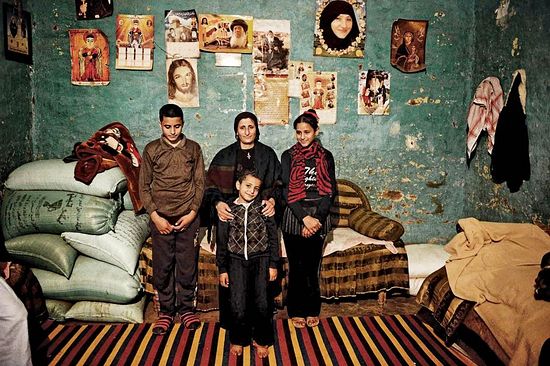 Wife, daughter and sons of 42-year-old slain laborer Tawadros Youssef, who was one of the Egyptian Coptics killed by ISIS. JONATHAN RASHAD
Wife, daughter and sons of 42-year-old slain laborer Tawadros Youssef, who was one of the Egyptian Coptics killed by ISIS. JONATHAN RASHAD
RESIST OR RUN
The Arab Spring was problematic for Christians in the Middle East, and not just because it propelled Islamists to power in places like Egypt. The revolts also exposed the unseemly compromise many Christian groups had made: support dictators in exchange for protection. In Syria, Christians had historically been persecuted, but they were protected under Bashar Assad and his father, Hafez, before him. Partially this is because Assad’s Baath regime was founded by Syrian Greek Orthodox Christian Michel Aflaq and emphasizes nationalism above ethnicity or religion. While many Christians took a neutral stance when the peaceful demonstrations against Assad began in March 2011, resentment against them remains. Even before the rise of ISIS, both Alawites and Christians were targeted by Syrian rebel forces.
Samer Massouh, a Roman Catholic lawyer who lived in Homs from 2013 until earlier this year while conducting research on Christians for Germany’s Friedrich-Ebert Foundation, says Christians are under threat from all sides in Syria—from ISIS, from Assad’s regime and from some anti-regime forces. But the main reason Christians flee is the same as for people of other faiths—the total collapse of the economy and civil society, the lack of electricity, schools and other basics of life. Add to that the persecution by ISIS and many find little reason to stay. “It is not something that came out of the blue,” Massouh says. “The Christians in Syria and the wider Middle East, they always live within their countries with the perception that they would be persecuted. ISIS came as a confirmation of that.”
In the area around Homs, a strategic position for the opposition because of the supply routes to Lebanon, an estimated 10,000 Christians have either left their homes or been displaced.
Even if you’re not on the front line, staying can be a daunting and sometimes heartbreaking challenge. In Damascus one Sunday in March at the Church of Olives in the Old City, a 47-year-old parishioner attending Mass who would only give his first name (George) expresses the sentiments of many Christians, saying, “This is my country, and I don’t want to leave.” Nonetheless, he has sent his wife and children to Abu Dhabi.
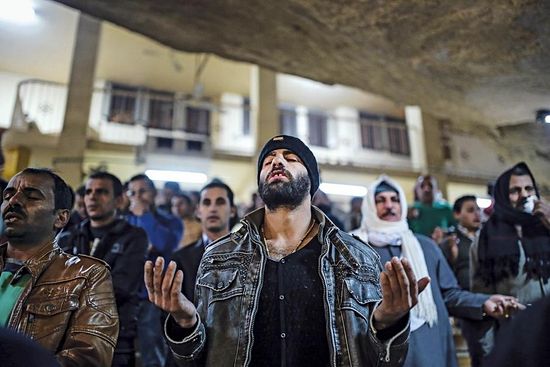 Coptic Christians attend Orthodox Christmas Eve Mass in the Cave Cathedral or St. Sama'ans Church on the Mokattam hills overlooking Cairo, Egypt, January 6, 2015. MOSA'AB ELSHAMY/AP
Coptic Christians attend Orthodox Christmas Eve Mass in the Cave Cathedral or St. Sama'ans Church on the Mokattam hills overlooking Cairo, Egypt, January 6, 2015. MOSA'AB ELSHAMY/AP
Nicholas Heras, a political analyst who has conducted an extensive study on the Christian population in Syria, believes Christians are vulnerable because the majority of them live in strategic areas of the country—Homs, Aleppo, Damascus and their provinces—where the heavy fighting is taking place. In Aleppo, it is estimated that close to 30,000 Christians are among those who have fled.
One of them, a 19-year-old Greek Catholic named Rasha who now lives in Beirut, sees little hope for Christians in the Middle East. “Unfortunately, we’re a long way from a solution,” he says. “This will make Christians feel threatened by death at all times and scared, of course. Not free. Not safe, and sometimes desperate.”
At St. Mary’s Church in Homs one day in March, Lamis, a 27-year-old woman who also gave only her first name, says her sister moved to the United Arab Emirates but she does not want to leave, even though she fears ISIS. “If I should die,” she says, “at least I will die here in my home.”
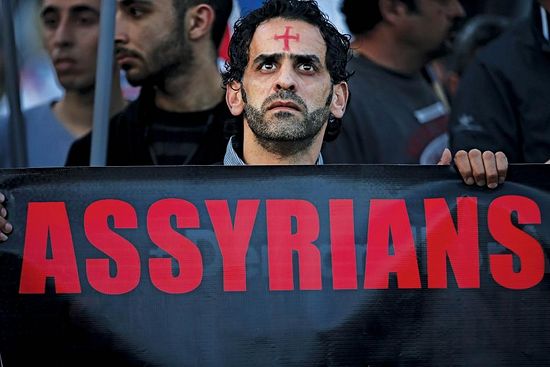 An Assyrian man with a red cross painted on his forehead holds a banner as he walks during a protest of several hundred people in solidarity with Christians abducted in Syria and Iraq, in downtown Beirut, Lebanon, February 28, 2015. HUSSEIN MALLA/AP
An Assyrian man with a red cross painted on his forehead holds a banner as he walks during a protest of several hundred people in solidarity with Christians abducted in Syria and Iraq, in downtown Beirut, Lebanon, February 28, 2015. HUSSEIN MALLA/AP
Assyrian Christians in northeastern Syria have been targeted by ISIS in recent months. More than 200 Assyrian Christians were taken hostage near the village of Hasakah in February, and ISIS forces swept through several predominantly Assyrian Christian villages, forcing thousands of people to leave.
There are Christians prepared to fight back. Kino Gabriel is the spokesman for a militia called the Syriac Military Council that was created in January 2013 to defend the Syriac people, who comprise various Christian groups, including Assyrians, Syriac Orthodox, Syriac Catholics, Chaldeans and Maronites. The council fought alongside Kurdish fighters against ISIS around Hasakah in February. “We are working to preserve our existence inside Syria,” Gabriel says. “It’s our homeland. Our ancestors have been here for the last three or four thousand years. If we moved away from here we would lose ourselves, our identity.”
He speaks bitterly of the Assad regime, saying it has done nothing but weaken the Syriac people for the past 40 years, preventing them from teaching their language and culture. “For us it’s the same threat by ISIS, by the regime and from all regimes that don’t recognize the differences between peoples,” he says, appealing for international military help.
The ISIS assault has been just as fierce in northern Iraq. “In addition to forcing the mass exodus from thousand-year-old villages, [ISIS militants] destroy churches, libraries and monuments to wipe out any trace of these being Christian areas,” says Sajad Jiyad, the director of research at independent research consultancy Integrity in Baghdad.
That is what happened in Mosul when ISIS took over the city in June 2014. Earlier, under Saddam Hussein’s despotic rule, the city was a sanctuary, home to tens of thousands of Christians. But in Mosul and other towns in the region, ISIS gave Christians an ultimatum—convert to Islam, pay a tax known as jizyaor be killed. Aziz Emmanuel al-Zebari, 65, is a Chaldean Catholic who left Mosul in 2006 and moved to Ankawa, an Assyrian suburb of Erbil, in the Kurdish region of northern Iraq, where a statue of the Virgin Mary watches over the streets outside the Cathedral of St. Joseph. A professor of English at Salahaddin University in Erbil, al-Zebari says more than 125,000 Christians from Mosul and the surrounding Plains of Nineveh have been driven from their homes. He lists a string of Christian towns he says are now deserted: Qaraqosh, Karemlesh, Bartella, Bashiqa, Tel Keppe, Batnaya, Tesqopa, Alqōsh, Sharafiya. “For the last nine months the church bells have gone silent and there is not a single Christian in those villages and the city of Mosul,” al-Zebari says.
William Warda, an Assyrian Christian from the Hammurabi Human Rights Organization in Baghdad, says he hears from Christians that they want to leave. “I tell them that they must stay or we will not have a Christian population,” he says. “I go to northern Iraq, and I tell people to stay in their villages, not to run away, to resist. I tell them to be patient. I try to reassure them it is a temporary crisis, and it will pass.”
But will it? The Center for American Progress report says what is happening to Christians in the region is an indicator of what kind of society will emerge from the chaos: “If one of the most important religious groups in the world continues to be forced out of the Middle East, this bodes negatively for pluralism, tolerance and the ability of the region’s people to live interlinked with the rest of the world.”
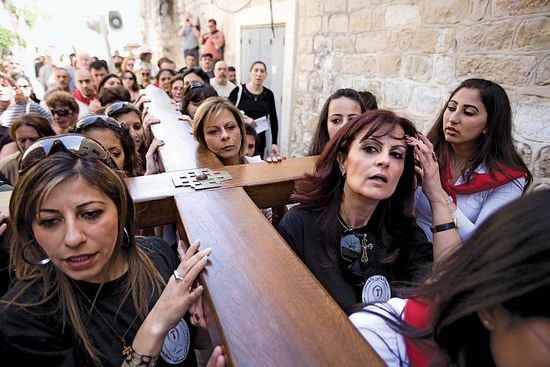 Proudly shouldering the religious symbol of a wooden cross, Arab Catholic Scouts participate in The Stations of the Cross procession for Catholic Easter in the Old City of Jerusalem, Israel on March 21, 2008. ED KASHI/VII
Proudly shouldering the religious symbol of a wooden cross, Arab Catholic Scouts participate in The Stations of the Cross procession for Catholic Easter in the Old City of Jerusalem, Israel on March 21, 2008. ED KASHI/VII
LIVING IN LIMBO
There is already an example of what happens when a society fails to resolve the differences between people of different faiths. The Holy Land is still safe for Christians, but the stalemate in the Israeli-Palestinian crisis makes life there a struggle for the few Christians who remain. The recent re-election of Prime Minister Benjamin Netanyahu, who campaigned on a hard-line ticket, offers little hope for a settlement.
In the district that includes Jerusalem, the holiest city in Christianity, the number of Christians has fallen to around 32,000, according to Bernard Sabella, an associate professor of sociology at Al-Quds and Bethlehem universities. “We need to have a political solution,” he says. “All of us are living in limbo.”
Raffoul Rofa, director of the Society of St. Yves, a Catholic human rights group in Israel, says about 100 Christian families he knows have recently left. “Social instability, the political situation, the building of the separation wall, the difficult economic situation,” he says. “It is bleak. If this continues, the time will come when Palestine will not have Christians.”
Of the 4 million Palestinians living in the West Bank and Gaza, only around 2.5 percent are Christians, and conditions there are even more difficult than in Israel.
Samia Khalilieh and her husband live with their two youngest children in Beit Jala, a West Bank town in the governorate of Bethlehem, the biblical birthplace of Jesus. She is Greek Orthodox, and the family grows olives on farmland in the Cremisan Valley. The latest threat to their way of life is Israel’s proposal to extend through their farmland the separation barrier it has built to wall off the West Bank. “When the route is done, they will uproot the olive trees and excavate the land and destroy it,” Khalilieh explains. “These lands are a part of our life, our culture. This is a tradition that has been there for years, from our grandfathers, our ancestors.”
Khalilieh wonders whether her two eldest children will return home once they finish university in Germany. She isn’t sure whether she wants them to do so. “I love my country, really I do not want to leave, but if it’s going to get worse here you do not have any other option,” she says. “For us, we are used to facing the occupation problems. But my children, would they stay here in this prison?
“This is the land of Christ, but without Christians here, it is like having the stones without the spirit—having all the churches here but without the spirit of the people.”
